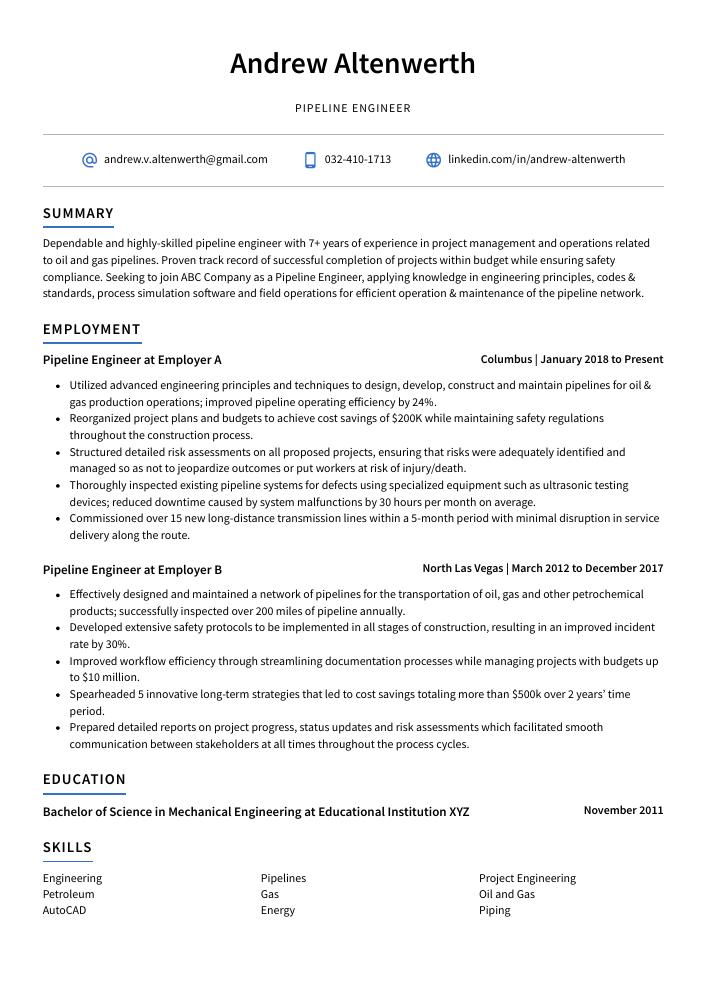Pipeline Engineer Resume Guide
Pipeline engineers are responsible for designing, constructing and maintaining pipelines used to transport oil and gas. They ensure the safety of these pipelines by conducting inspections, tests and repairs as needed. Additionally, they may also consult on environmental regulations related to pipeline operations and develop plans for emergency response in case of a spill or other incident.
You have a knack for pipeline engineering, but potential employers don’t know it yet. To show them what you can do and make them aware of your qualifications, you must craft an eye-catching resume to grab their attention.
This guide will walk you through the entire process of creating a top-notch resume. We first show you a complete example and then break down what each resume section should look like.
Table of Contents
The guide is divided into sections for your convenience. You can read it from beginning to end or use the table of contents below to jump to a specific part.
Pipeline Engineer Resume Sample
Andrew Altenwerth
Pipeline Engineer
andrew.v.altenwerth@gmail.com
032-410-1713
linkedin.com/in/andrew-altenwerth
Summary
Dependable and highly-skilled pipeline engineer with 7+ years of experience in project management and operations related to oil and gas pipelines. Proven track record of successful completion of projects within budget while ensuring safety compliance. Seeking to join ABC Company as a Pipeline Engineer, applying knowledge in engineering principles, codes & standards, process simulation software and field operations for efficient operation & maintenance of the pipeline network.
Experience
Pipeline Engineer, Employer A
Columbus, Jan 2018 – Present
- Utilized advanced engineering principles and techniques to design, develop, construct and maintain pipelines for oil & gas production operations; improved pipeline operating efficiency by 24%.
- Reorganized project plans and budgets to achieve cost savings of $200K while maintaining safety regulations throughout the construction process.
- Structured detailed risk assessments on all proposed projects, ensuring that risks were adequately identified and managed so as not to jeopardize outcomes or put workers at risk of injury/death.
- Thoroughly inspected existing pipeline systems for defects using specialized equipment such as ultrasonic testing devices; reduced downtime caused by system malfunctions by 30 hours per month on average.
- Commissioned over 15 new long-distance transmission lines within a 5-month period with minimal disruption in service delivery along the route.
Pipeline Engineer, Employer B
North Las Vegas, Mar 2012 – Dec 2017
- Effectively designed and maintained a network of pipelines for the transportation of oil, gas and other petrochemical products; successfully inspected over 200 miles of pipeline annually.
- Developed extensive safety protocols to be implemented in all stages of construction, resulting in an improved incident rate by 30%.
- Improved workflow efficiency through streamlining documentation processes while managing projects with budgets up to $10 million.
- Spearheaded 5 innovative long-term strategies that led to cost savings totaling more than $500k over 2 years’ time period.
- Prepared detailed reports on project progress, status updates and risk assessments which facilitated smooth communication between stakeholders at all times throughout the process cycles.
Skills
- Engineering
- Pipelines
- Project Engineering
- Petroleum
- Gas
- Oil and Gas
- AutoCAD
- Energy
- Piping
Education
Bachelor of Science in Mechanical Engineering
Educational Institution XYZ
Nov 2011
Certifications
Certified Pipeline Engineer
American Petroleum Institute (API)
May 2017
1. Summary / Objective
Your resume summary should be like an elevator pitch – it should provide the hiring manager with a concise overview of your qualifications as a pipeline engineer. In this section, you can highlight any relevant certifications or degrees that make you stand out from other applicants. You could also mention how many years of experience in the field you have and what projects you’ve worked on in the past. Finally, include some information about your ability to troubleshoot complex issues quickly and efficiently.
Below are some resume summary examples:
Skilled pipeline engineer with 5+ years of experience in the oil and gas industry. At XYZ, performed inspections on over 500 miles of pipeline ensuring safety and regulatory compliance. Experienced in project management, cost estimation, budgeting, system design & development as well as troubleshooting existing systems to identify potential issues. Adept at working collaboratively with cross-functional teams to ensure timely completion of projects within budget constraints.
Talented and experienced pipeline engineer with a successful track record of designing, constructing and managing pipelines for the transportation of oil and natural gas. Utilized state-of-the-art software to ensure compliance with codes, regulations, and standards. Possess excellent understanding of design principles related to piping systems including flanges, valves, gaskets etc., as well as safety procedures required when working in hazardous environments.
Determined pipeline engineer with 5+ years of experience in planning, designing and managing pipeline projects. At XYZ, managed a team of 10 engineers to complete the construction project ahead of schedule while saving 15% on budget costs. Successfully implemented new technological advancements that increased safety standards by 30%. Skilled at developing strategies for efficient production processes and excellent problem-solving abilities.
Well-rounded pipeline engineer with 8+ years of experience in the oil and gas industry. Proven track record working on complex projects, including planning and designing pipelines for energy transportation systems. Experienced in developing cost efficient solutions while meeting safety regulations and environmental standards. Looking to join ABC as a pipeline engineer to drive successful project completion within tight timelines.
Committed, experienced pipeline engineer with 10+ years of experience in the oil and gas industry. Skilled at designing, building, and managing complex pipelines for transporting oil, natural gas, and other fluids from source to destination. Adept at leading projects involving multiple stakeholders while keeping within budget parameters; successfully completed 6 large-scale projects on time and under budget.
Seasoned pipeline engineer with 5+ years of experience in the construction, installation, and maintenance of pipelines for oil and gas companies. Expertise lies in executing projects on time while controlling costs within budget constraints. Most recently developed a system to monitor pipeline flow-rates that saved Company X $150K annually. Looking to join ABC Tech as their lead pipeline engineer.
Driven pipeline engineer with 10+ years of experience designing, building and maintaining gas and oil pipelines throughout the United States. Achieved a 95% successful startup rate for projects on time or ahead of schedule. Passionate about using my expertise to join ABC’s pipeline engineering team in order to contribute to their success while improving safety standards along the way.
Diligent and experienced pipeline engineer with 8+ years of experience in the oil and gas industry. Skilled at developing, managing, and maintaining pipelines while ensuring safety compliance. Seeking to join ABC Energy as a senior pipeline engineer where I can utilize my expertise in engineering design processes to ensure optimal operations for their clients.
2. Experience / Employment
In the experience section, you should provide details on your employment history. This section should be written in reverse chronological order, meaning that the most recent role is listed at the top.
When writing about what you did in each job, stick to bullet points. Doing so allows the reader to quickly digest what you have said and understand it better. You want to take some time to think of specific tasks or accomplishments and any results achieved from them as well as quantifiable metrics when possible.
For example, instead of saying “Managed pipeline operations,” say something like “Oversaw daily operations for a 500-mile natural gas pipeline network with an annual throughput capacity of 1 billion cubic feet per day.”
To write effective bullet points, begin with a strong verb or adverb. Industry specific verbs to use are:
- Designed
- Constructed
- Installed
- Inspected
- Monitored
- Operated
- Troubleshot
- Calibrated
- Commissioned
- Validated
- Fabricated
- Welded
- Assessed
- Analyzed
- Optimized
Other general verbs you can use are:
- Achieved
- Advised
- Compiled
- Coordinated
- Demonstrated
- Developed
- Expedited
- Facilitated
- Formulated
- Improved
- Introduced
- Mentored
- Participated
- Prepared
- Presented
- Reduced
- Reorganized
- Represented
- Revised
- Spearheaded
- Streamlined
- Structured
- Utilized
Below are some example bullet points:
- Actively collaborated with engineering teams to develop and design pipelines, leading the completion of 5+ major projects within 3 years.
- Coordinated installation activities for over 15 miles of pipeline; oversaw safety protocols during welding operations and ensured that all regulations were met in compliance with industry standards.
- Compiled detailed reports on pipeline integrity issues, including test results from pressure tests, corrosion surveys & cathodic protection monitoring; successfully identified potential problems before they occurred saving $50K in repairs costs last year alone.
- Welded together 20-inch diameter steel pipes using various techniques such as stick welding or gas tungsten arc welding (GTAW); completed this task up to two times faster than average without compromising quality or safety measures taken throughout the process.
- Reduced total project cost by 18% through effective budget planning/management strategies which included negotiating better prices for materials and labor services used in pipe fabrication processes.
- Analyzed and interpreted technical drawings, layout diagrams and survey data to design over 40 pipeline systems for oil & gas industries; reduced engineering time by 10%.
- Facilitated the installation of pipelines in multiple onshore and offshore locations across 3 continents with minimal disruption to local businesses and communities.
- Presented detailed designs, cost estimates and maintenance plans at client meetings while confidently answering any questions or concerns they had regarding the project scope.
- Validated functionality of piping systems through extensive testing procedures prior to commissioning them into service; identified potential issues that saved an estimated $500K+ in repairs costs during pre-operational testing phases alone.
- Confidently managed team of 25 engineers, technicians and laborers throughout all stages of pipeline construction projects; completed 6 major projects ahead of schedule due to effective resource planning strategies developed by supervising personnel.
- Expedited the installation of pipelines and related equipment for 6+ major oil & gas projects, resulting in completion of tasks up to 3 months ahead of schedule.
- Achieved a 30% improvement in pipeline efficiency through the introduction of innovative design solutions and advanced technologies.
- Advised management on best practices regarding safety regulations, environmental protection policies and operational procedures; reduced workplace-related accidents by 25%.
- Reliably monitored all stages of pipeline construction from initial site survey through to final inspection; successfully completed 8 projects with zero defects or delays over past 2 years.
- Introduced new methods for testing pipe integrity which increased reliability by 40%, enabling successful operations even under extreme pressure conditions (up to 60 bar).
- Represented engineering team in the design and installation of pipelines for water, oil, gas & wastewater systems; successfully completed projects worth over $2 million.
- Revised existing pipeline designs to ensure maximum efficiency and cost-effectiveness while meeting safety requirements; reduced construction costs by 10%.
- Resourcefully utilized cutting-edge technologies such as GIS/CAD software, fiber optics & remote sensing equipment to monitor pipeline operations from a single location.
- Installed 1,500+ feet of new underground piping infrastructure within 8 hours using specialized tools and techniques that minimized environmental impacts on local wildlife habitats and ecosystems.
- Formulated comprehensive plans for regular maintenance activities which significantly improved operational reliability across clients’ networks with no downtime reported due to breakdowns or malfunctions in the past year.
- Substantially improved pipeline efficiency by 25% within 6 months through the implementation of innovative engineering solutions.
- Participated in 10+ projects involving the construction, maintenance and modification of natural gas pipelines across 3 states; successfully completed all work on time and under budget.
- Fabricated necessary pipe fittings to precise specifications using manual machinery and automated welding equipment, resulting in no defects or rework requests from clients over a two year period.
- Designed multiple new pipeline systems incorporating latest safety standards while meeting customer needs for cost-effectiveness; reduced total project costs by $50,000+.
- Streamlined existing operations processes to increase productivity levels by 20%, thus reducing overall energy consumption for customers’ energy networks by 35%.
- Operated heavy machinery to construct pipelines and related infrastructure, ensuring that all safety regulations were followed at all times; completed installation of over 4 miles of pipeline in just 2 months.
- Constructed complex pipeline systems for the transport of oil and gas products, carrying out extensive repairs with minimal disruption to existing services.
- Demonstrated excellent problem-solving skills when troubleshooting any issues encountered during construction or maintenance processes; improved efficiency by 15%.
- Efficiently managed an 8-member engineering team while overseeing day-to-day operations on a major project worth $1 million, meeting deadlines ahead of schedule within budget constraints.
- Optimized layout designs using 3D software models to identify potential risks before beginning work on site; reduced the time taken for design reviews by 50%.
- Meticulously monitored and analyzed the performance of dozens of pipelines, identifying potential risks and resolving over 500 issues in a timely manner.
- Mentored junior engineers on how to inspect pipeline systems for safety compliance; decreased inspection time by 40%.
- Assessed infrastructure designs against legal requirements in order to ensure that all energy transport projects were completed within budget constraints ($1 million).
- Calibrated data acquisition tools used for measuring gas or liquid flow rates accurately; reduced measurement errors by 10%.
- Troubleshot technical problems encountered along the pipelines’s routes quickly and effectively, resulting in improved efficiency (20%) and reliability standards across 15+ sites nationwide.
3. Skills
Even though two organizations are hiring for the same role, the skillset they want an ideal candidate to possess could differ significantly. For instance, one may be on the lookout for an individual with experience in pipeline engineering and the other may be looking for someone with expertise in underground utility construction.
As such, it is important to tailor your skills section of your resume to each job you are applying for. This will help ensure that applicant tracking systems filter out resumes that don’t have all the required qualifications or keywords listed on them.
In addition to listing relevant skills here, you should also discuss some of these qualities in more detail elsewhere on your resume – this could be done through a summary statement or by elaborating further on certain experiences from past jobs/internships.
Below is a list of common skills & terms:
- ASME
- Ansys
- AutoCAD
- CAD
- Civil Engineering
- Commissioning
- Construction Management
- EPC
- Energy
- Energy Industry
- Engineering
- Engineering Design
- Feed
- Finite Element Analysis
- Gas
- Inspection
- MATLAB
- Manufacturing
- Mechanical Engineering
- Natural Gas
- Offshore Drilling
- Oil
- Oil and Gas
- Oil and Gas Industry
- Onshore
- P&ID
- Petrochemical
- Petroleum
- Pipelines
- Piping
- Project Engineering
- Project Planning
- Refinery
- SOLIDWORKS
- Subsea Engineering
- Teamwork
- Upstream
4. Education
Including an education section on your resume will depend on how far along you are in your career. If you just graduated and have no work experience, mentioning your educational background below the resume objective is recommended. However, if you have significant work experience to showcase, it might be best to omit an education section altogether.
If including an education section, try to focus on courses or assignments related specifically to pipeline engineering that demonstrate a deeper understanding of the industry and job role.
Bachelor of Science in Mechanical Engineering
Educational Institution XYZ
Nov 2011
5. Certifications
Certifications are a great way to demonstrate your knowledge and expertise in a certain field. They show that you have taken the time and effort to gain additional qualifications, which can be very attractive for potential employers.
Including certifications on your resume is an effective way of showing off what you know and how much experience you have with specific skills or technologies related to the job position. This will make it easier for hiring managers to assess whether or not you are qualified for the role.
Certified Pipeline Engineer
American Petroleum Institute (API)
May 2017
6. Contact Info
Your name should be the first thing a reader sees when viewing your resume, so ensure its positioning is prominent. Your phone number should be written in the most commonly used format in your country/city/state, and your email address should be professional.
You can also choose to include a link to your LinkedIn profile, personal website, or other online platforms relevant to your industry.
Finally, name your resume file appropriately to help hiring managers; for Andrew Altenwerth, this would be Andrew-Altenwerth-resume.pdf or Andrew-Altenwerth-resume.docx.
7. Cover Letter
Including a cover letter with your job application is a great way to make yourself stand out from the crowd. It gives you an opportunity to express why you think you’d be the perfect fit for the role, beyond what’s mentioned in your resume.
Cover letters are typically made up of 2 or 4 paragraphs and provide recruiters with more insight into who you are as a professional. Although they may not always be required, putting in that extra effort can go a long way in helping land your dream job!
Below is an example cover letter:
Dear Marco,
I am writing to apply for the Pipeline Engineer position with your company. I am a civil engineer with 10 years of experience in pipeline design, construction, and maintenance. In my current role as Pipeline Engineer for ABC Corporation, I am responsible for overseeing the design and construction of natural gas pipelines ranging in diameter from 24″ to 36″.
During my time at ABC Corporation, I have successfully designed and constructed several high-pressure natural gas pipelines in difficult terrain. My experience has given me a deep understanding of both federal and state regulations governing pipeline construction. I have also developed strong relationships with key personnel at local utility companies, which has proved invaluable when seeking right-of-way easements or resolving construction issues.
In addition to my engineering experience, I have excellent project management skills. On multiple occasions, I have been asked to take on additional responsibilities outside of my normal scope of work due to staffing shortages. In these situations, I stepped up and managed teams of engineers and technicians while still meeting all project deadlines. This demonstrates my ability to think quickly and adapt to changing circumstances while remaining calm under pressure.
I believe that my combination of engineering experience and project management skills would make me an ideal candidate for the Pipeline Engineer position at your company. Please find attached a copy of my resume for your review; if you have any questions, do not hesitate to contact me at [phone number] or [email address]. Thank you for your consideration; I look forward hearing from you soon!
Sincerely,
Andrew
Pipeline Engineer Resume Templates
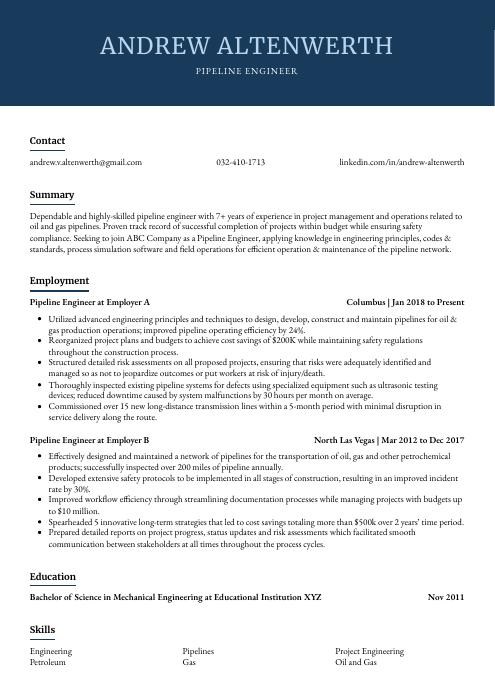 Bonobo
Bonobo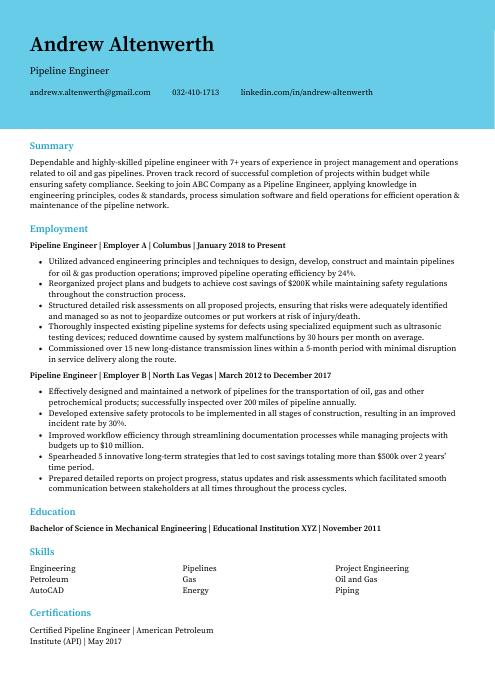 Dugong
Dugong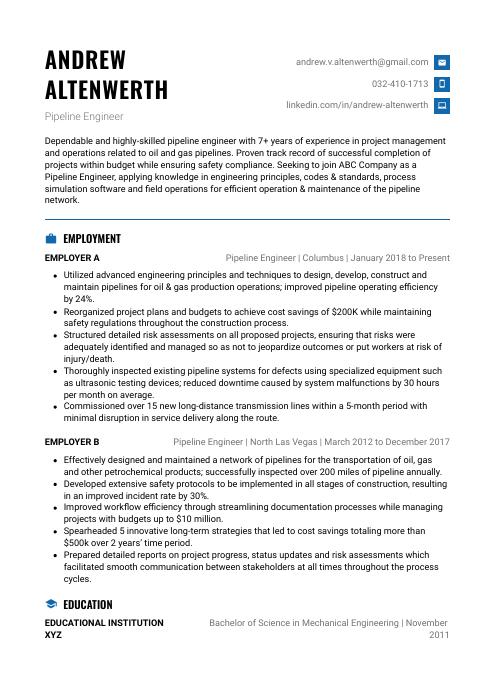 Echidna
Echidna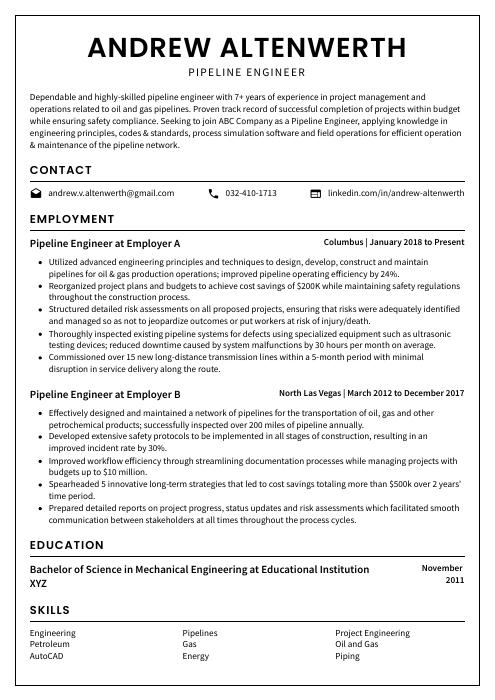 Cormorant
Cormorant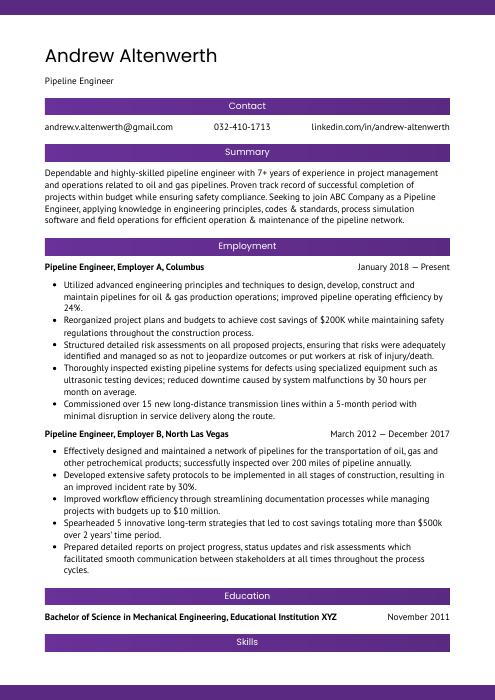 Jerboa
Jerboa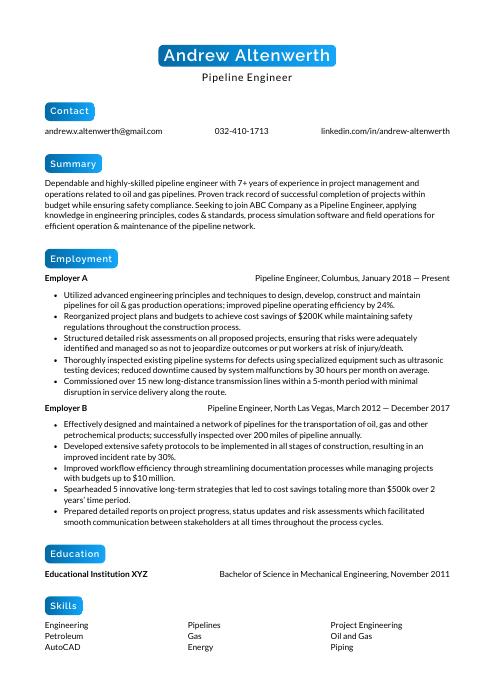 Kinkajou
Kinkajou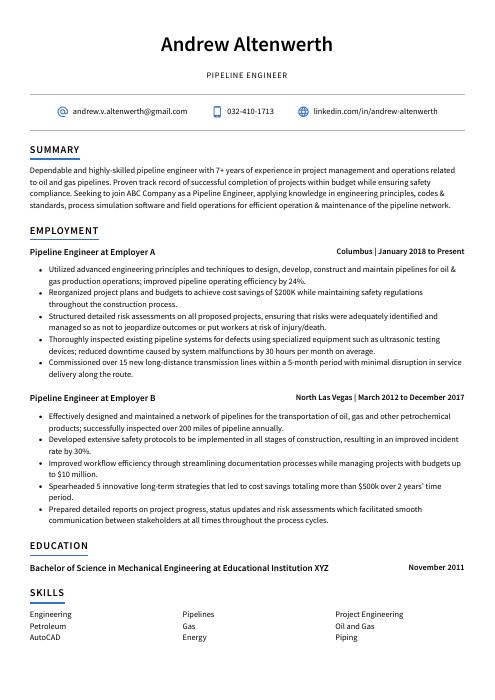 Axolotl
Axolotl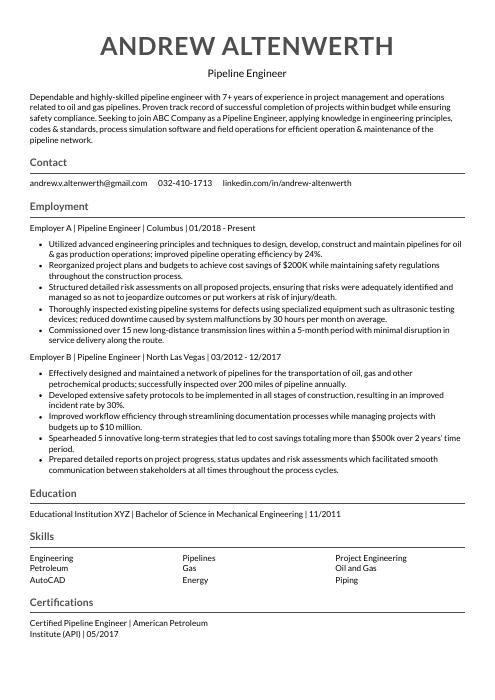 Indri
Indri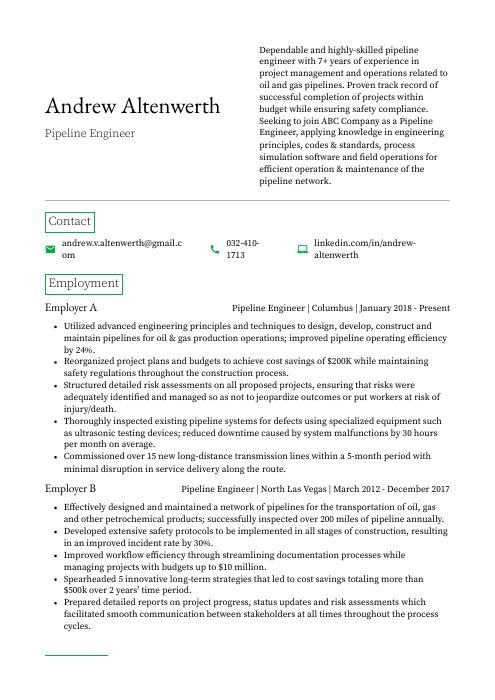 Quokka
Quokka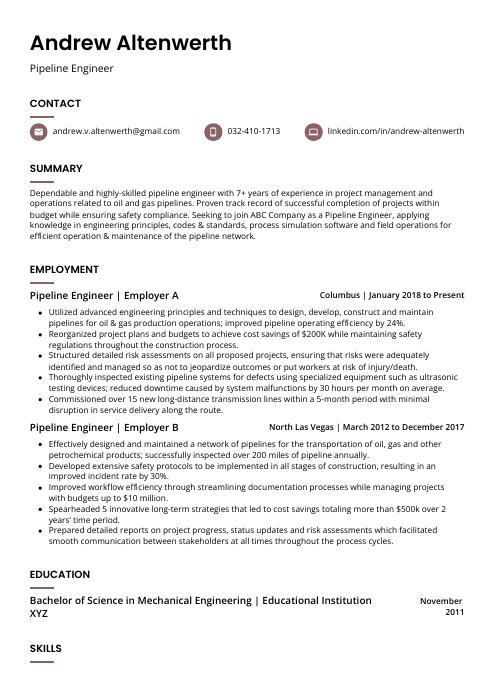 Fossa
Fossa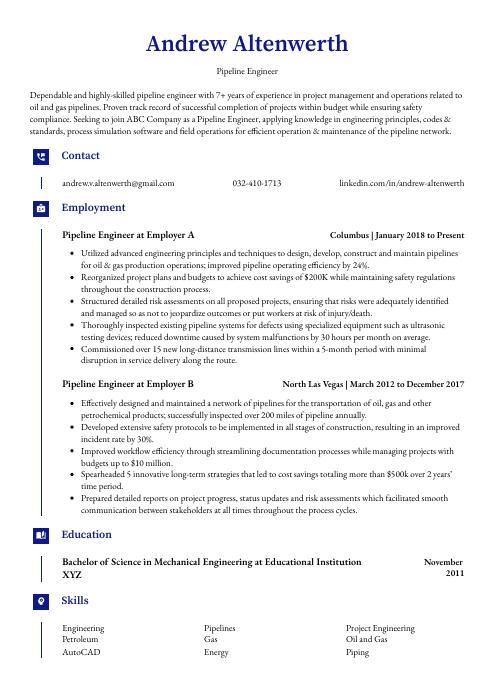 Gharial
Gharial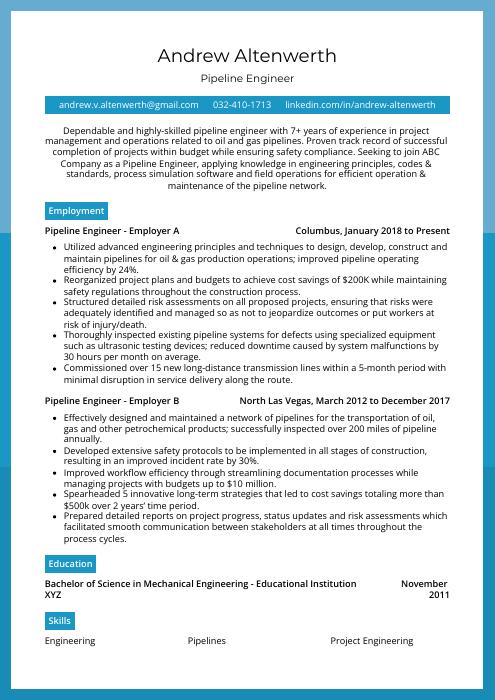 Rhea
Rhea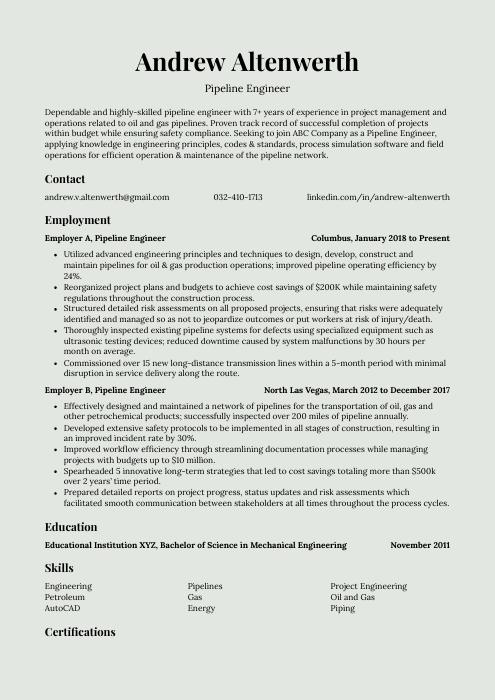 Saola
Saola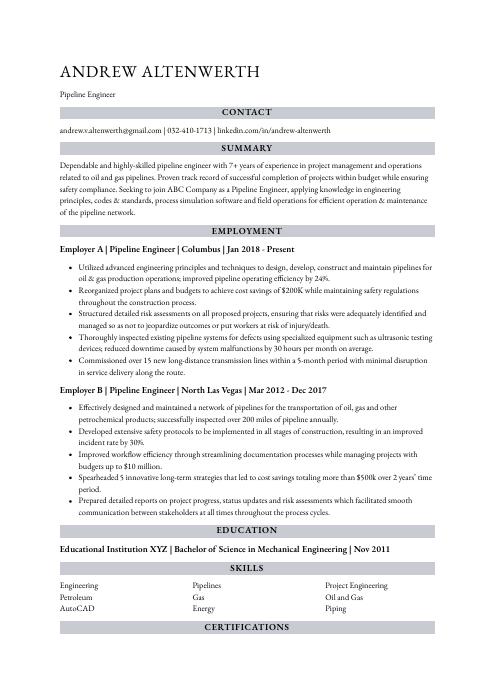 Numbat
Numbat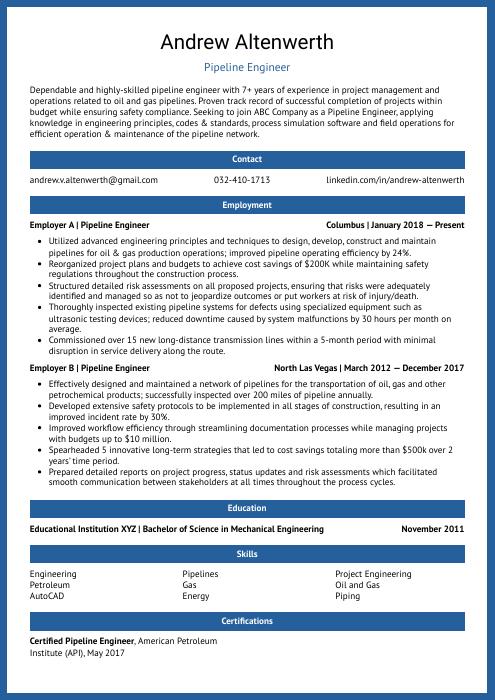 Ocelot
Ocelot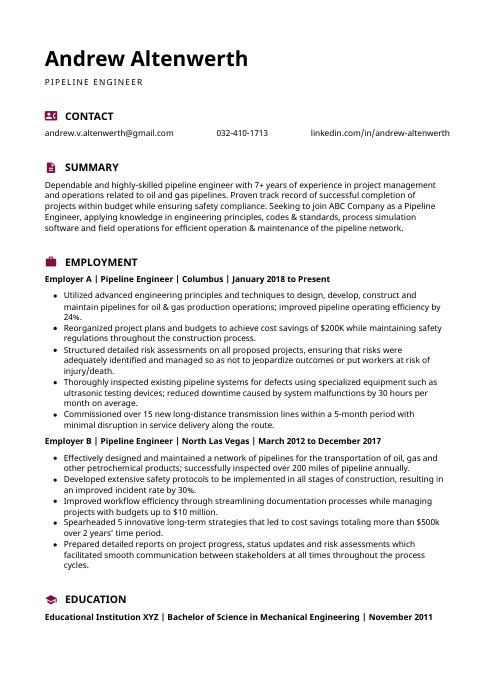 Hoopoe
Hoopoe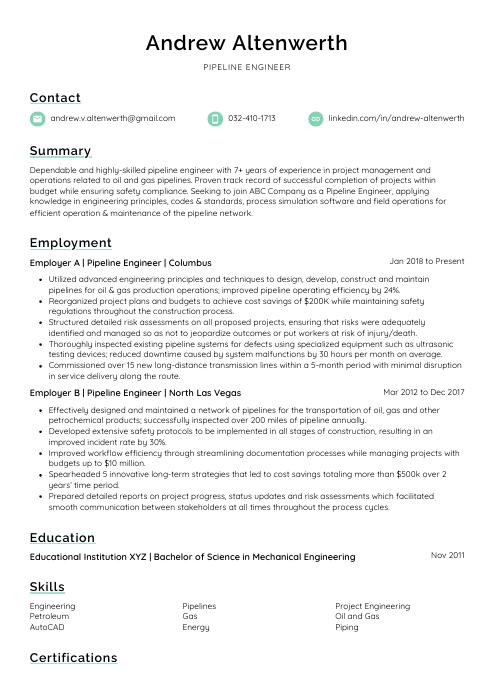 Lorikeet
Lorikeet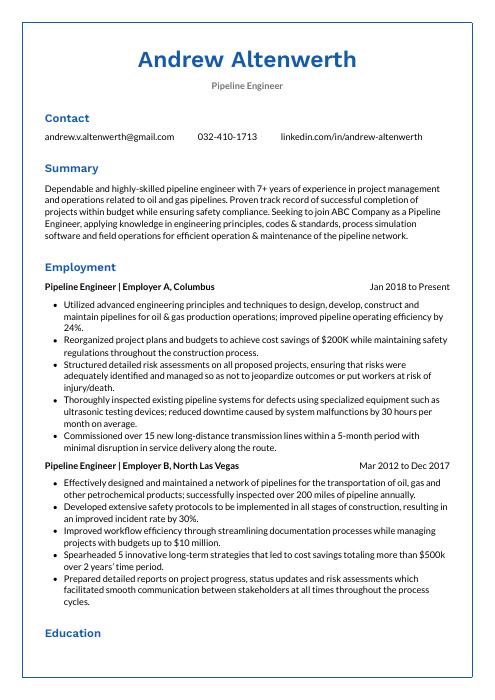 Markhor
Markhor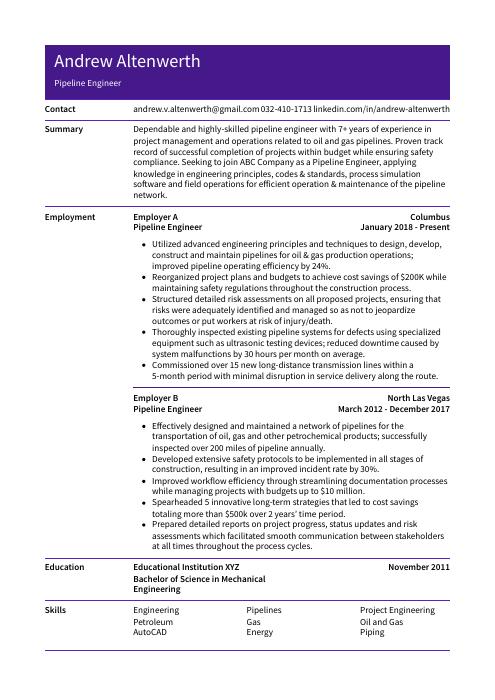 Pika
Pika Rezjumei
Rezjumei
